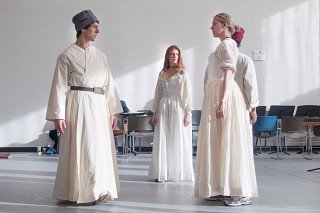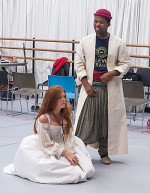Title

Singers from Juilliard and the Metropolitan Opera’s Lindemann Young Artist program will present Così fan tutte on November 14, 17, and 19. Pictured in rehearsal, from left: Ferrando (Lindemann artist Alexander Lewis), Dorabella (Artist Diploma candidate and Lindemann artist Wallis Giunta), Fiordiligi (alumna and Lindemann artist Emalie Savoy) and, with his back to the camera, Guglielmo (Lindemann artist Luthando Qave).
(Photo by Jeffrey Cuyubamba)In his 1790 opera Così fan tutte, Mozart mixes broad comedy with “great pathos and depth of expression,” according to Brian Zeger, artistic director of the Ellen and James S. Marcus Institute for Vocal Arts at Juilliard. And that depth and breadth were key factors in the decision to make Così the third Juilliard-Metropolitan Opera co-production. Directed by faculty member Stephen Wadsworth and conducted by faculty member and alumnus Alan Gilbert (in his first fully staged collaboration with Vocal Arts), the performances take place November 14-17 and feature singers from Juilliard and from the Met’s Lindemann Young Artist Development Program accompanied by the Juilliard Orchestra.
Body
Così fan tutte, also known as The School for Lovers, is the tale of two young soldiers, Guglielmo and Ferrando (sung by Lindemann fellows Luthando Qave and Alexander Lewis), who enter into a wager with Don Alfonso (Lindemann fellow Evan Hughes). Alfonso bets the two that their fiancées, like all women, are fickle (a rough translation of the opera’s title is “women are like that”). They cook up an elaborate plot to trick the two women, Fiordiligi (Lindemann fellow Emalie Savoy, B.M. ’08, M.M. ’10, voice) and Dorabella (Lindemann fellow and Artist Diploma candidate Wallis Giunta) with the aid of their maid, Despina (Artist Diploma candidate Naomi O’Connell).
Così is “very much a product of its time, and, unusually for an 18th-century opera, it is set in its time,” Wadsworth, who is also head of dramatic studies for the Lindemann program, wrote in a recent e-mail to The Journal. He added that 1790 “was a pretty rich, even scary time. The French Revolution was really getting under way in Paris, and the changes that the Enlightenment had been predicting since early in the century were now happening. Servants were claiming the same inalienable rights as their masters, women were claiming greater independence of thought, the ruling class was facing an unthinkable demotion, and everyone was extremely uncertain about how this volatile situation would resolve itself,” he added.
“Change is often terrifying, especially when the time has come to do it,” Wadsworth continued. “Don Alfonso and Despina introduce the four lovers to unsettling ideas, and the lovers blunder forward with no idea of what will happen. Yes, this is the arena of love, which might seem not politically charged, and even frivolous, but love personalizes the challenge and drama roiling everywhere at the time of Così’s creation.”
While the opera premiered in Vienna in 1790, it didn’t come to the U.S. until 1922, at the Met, in part because it was long considered salacious. And even after that it was “dismissed as frothy entertainment until pretty much the 1980s,” Wadsworth wrote. Today, however, it is among the most frequently performed operas in the world and has been adapted and reinvented for fi lm, theater, and the written word. Wadsworth said that he had “lived with Così almost all my life,” and even “sang Guglielmo as a hopeful, if not very good, singer!”
Così is the third Juilliard-Met co-production: It follows Smetana’s Bartered Bride (conducted by the Met’s artistic director, James Levine) in 2010 and the North American premiere of Gluck’s Armide (conducted by Jane Glover) in February. Conversations about a production of Così between Juilliard and the Met began back in 2010 while Bride was in production, said Zeger, who is also the executive director of the Lindemann program. Levine, who played an essential role in developing and executing the vision of the Lindemann program, was a strong proponent for the performance of the Mozart. Zeger noted that he and his Met and Juilliard colleagues “thought it would be wonderful after Bartered Bride to go back to a really standard, great masterpiece. We were looking for a very nourishing and classical piece which we could all grow from and love— and Maestro Levine had a lot to do with that.” Zeger added that in Così, “Mozart finds a way in this piece of balancing these two contradictory kinds of theater [comedy and pathos] in a way that’s not true of any other piece I can think of. Its range of expression is absolutely extraordinary.”
On a practical level, one advantage of performing the opera at Juilliard, Zeger said, is that Peter Jay Sharp Theater, which seats 933 (compared to the Met’s 3,800 seats) will make for a “wonderful theater for singers in their mid-20s to be projecting these roles,” adding, “this was part of our vision to present opera at Juilliard with singers from the Lindemann program and Juilliard working together.”
So far, the Met-Juilliard partnership has created a plethora of opportunities for Juilliard students within as well as outside the Vocal Arts Department. “There have been a lot of behind-the-scenes benefits that go beyond the visible productions,” Zeger said. Orchestral musicians at Juilliard, for example, have enjoyed privileged opportunities as students to play under Levine. And Vocal Arts students have seen opportunities to perform in Lindemann master classes, patron concerts, and auditions. The past three years have seen a constant flow of world-renowned teachers and coaches between Juilliard and the Met, granting Juilliard’s singers exposure to Met management and music staff. “The relationship with the Met has reset the bar at a higher level across the board in Vocal Arts,” Wadsworth said.





